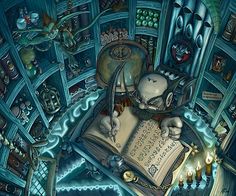The DMG provides some great guidance on selling items, but I thought it needed a little embellishment for buying items. These rules are meant to be fun and provide a little structure around character wish lists. I found that over the course of a a campaign the players ended up with mostly what they wanted, but never 100%, and it often took several shopping sprees to get those items. The pacing seemed about right to me, and kept items rare (relatively). We also had some fun roleplaying opportunities a couple of times when engaging with certain sellers.
The general premise is still the same: use Intelligence (Investigation) to find a seller and make the deal. You can search for as many items as you like, but a failure results in 10 days of your time and ends that cycle of buying. This roll can be eliminated with the right roleplaying or story, but absent any other context the roll is a useful mechanic.
The DC to find the item is as follows based on item rarity:
| Rarity |
DC |
| Common |
13 |
| Uncommon |
15 |
| Rare |
18 |
| Very Rare |
20 |
| Legendary |
23 |
These numbers assume a city. Increase the DC by 2 for a market town or 5 for a small town. Villages will likely not have any items.
Buying A Magic Item
| Rarity |
Base Price |
Days to Craft |
Days to
Find Seller |
d100 Roll
Modifier* |
| Common |
100 gp |
2 |
1d4 |
-10 |
|
|
|
1d6 |
0 |
| Uncommon |
500 gp |
10 |
1d6 |
0 |
|
|
|
1d8 |
+10 |
|
|
|
1d8 |
+10 |
| Rare |
5,000 gp |
Months |
1d8 |
+10 |
|
|
|
1d8 |
+10 |
| Very Rare |
50,000 gp |
Years |
1d10 |
+20 |
| Legendary |
Adventure/Quest† |
Decades |
n/a |
n/a |
- Apply this modifier to rolls on the Magic Item Search Results table.
† If the transaction is purely monetary, it is likely 10x the price of a Very Rare item
Magic Item Search Results
Search results should always interesting. Shady sellers always have strings attached. I found the easiest thing to do is to use the Magic Item Quirks table (DMG 143) as the reason why, or to exaggerate a Minor Property (DMG 143) to the point of being annoying. Other options include: requiring attunement when the item does not normally require it, limiting the number of uses per day, requiring some other cost (e.g., gp, HP, mundane consumables such as oil, holy water, etc.).
| d100 + Mod |
You Find… |
| 20 or lower |
A shady seller offering a tenth of the base price |
| 21–40 |
A shady seller offering a quarter of the base price (50%), or a seller offering half the base price (50%) |
| 41–80 |
A shady seller offering half the base price (50%), or a seller offering the full base price (50%) |
| 81–90 |
A seller offering the full base price |
| 91 or higher |
A seller offering one and a half times the base price |
Consumables
This includes potions and scrolls primarily. Scrolls are important as they are the primary means for Wizards to learn new spells. Additionally, scrolls are usable by anyone and can provide useful utility to non-casters.
| Rarity |
Scroll Level |
Consumable
Base Price |
Days to Craft |
| Common |
1 |
50 gp |
1 |
|
2 |
100 gp |
2 |
| Uncommon |
3 |
200 gp |
4 |
|
4 |
400 gp |
8 |
|
5 |
800 gp |
16 |
| Rare |
6 |
1,200 gp |
24 |
|
7 |
2,500 gp |
50 |
| Very Rare |
8 |
5,000 gp |
100 |
| Legendary |
9 |
10,000 gp |
200 |
Healing Potions Too?
That’s up to you. I doubt you can just walk into a general store and buy a dozen Healing Potions, but if that’s the commonality of magic in your game go for it. Personally, I include Healing Potions into the mix.
Scrolls For Everyone
One alternate rule we use for scrolls is that if the spell is not potentially accessible to the character (i.e., not on the class spell list), the scroll requires an Intelligence (Arcana) roll with a DC of 8 + Spell Level. If the roll fails, the scroll is destroyed.










